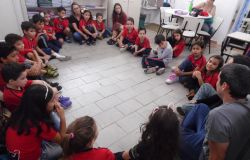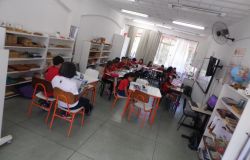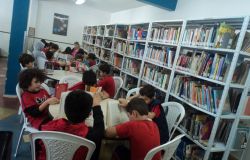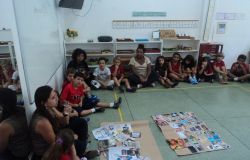The elementary grades at Saci International School have the educational proposal of addressing the cognitive, physical, emotional, social, and ethical in view of a broad formation of individuals.
The construction of values and attitudes that guide interpersonal relations as well as the contact of the student with the object of knowledge are part of this long stage. It is essential, in this process that values continuous learning and constant exchange between student and learning mediators, a work position that considers cooperation, mutual respect, awareness, persistence and commitment to overcome challenges.
For children in the early grades, learning to live together is a real need, not just a challenge proposed by the school. Thus, the work developed expects the organization of proposals in which students discuss their routine with their classmates, not only in the classroom, but with the teachers in group dynamics, Montessori line exercises and different activities developed with this goal.
The work with Projects developed in this segment, nurture an active and meaningful learning, the development of autonomy, the exchange of knowledge, and the constant search for new information. Early on, students learn to be a producer of knowledge, creating theories, trying to explain as to convince their colleagues or be convinced by them, seeking new information and connecting with those already owned by building new theories and knowledge.
In order to have this space, the student is seen as the protagonist and the classes are planned in a practical way, reducing the teacher's oral exposure time.
At Saci International School, while students, individually or in groups, learn to add, for example, they use different concrete materials. So, they carry out what Maria Montessori called 'self-education'. Thus, they also learn to work as a team, to understand that there are many ways to solve the same problem, that it is necessary to have perseverance, and that without the intellectual effort, learning is mechanical and temporary.
The assessment is procedural and the observations shared with each family, individually. The quantitative results are recorded quarterly. The student also carries out a self-evaluation and is encouraged to express himself / herself about it, thus having a constant reflection on his / her personal and academic development.
The curriculum in early grades of elementary school
I - Mathematics
II - Portuguese
III – Cosmic Education (History, Geography and Science)
IV - Arts
V – Physical Education
VI - Computer Science
VII - Music
VIII – English (in the curriculum of 4th and 5th grades and optional from 3 years of age in Bilingual Program - immersion environment - daily from 10h30 to 13h or from 12h30 to 15h).







